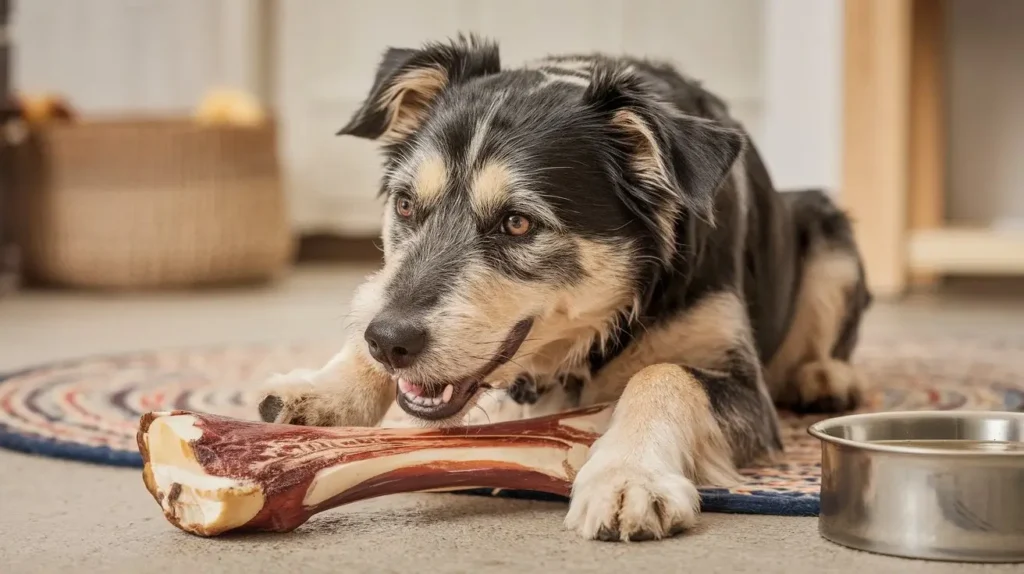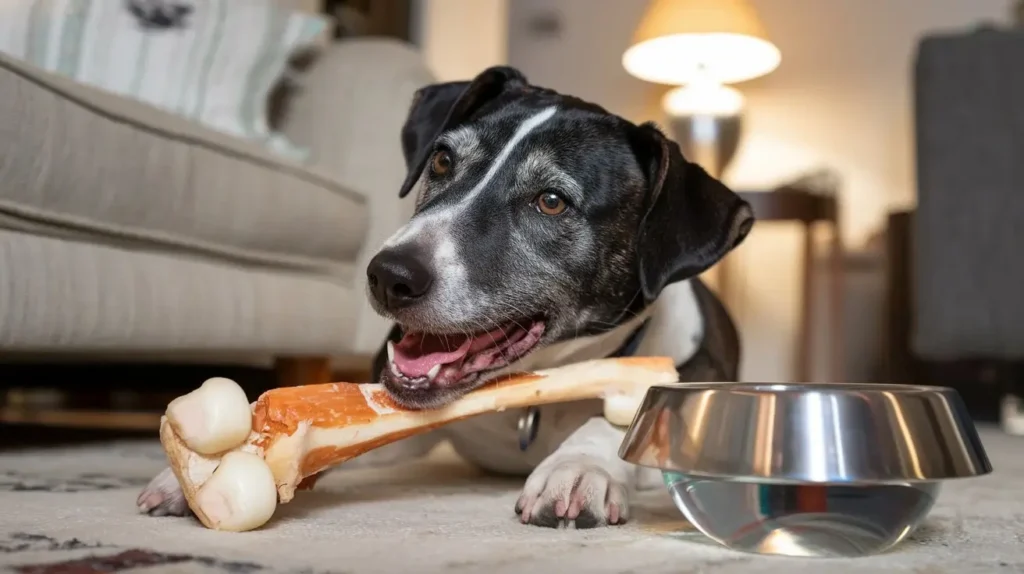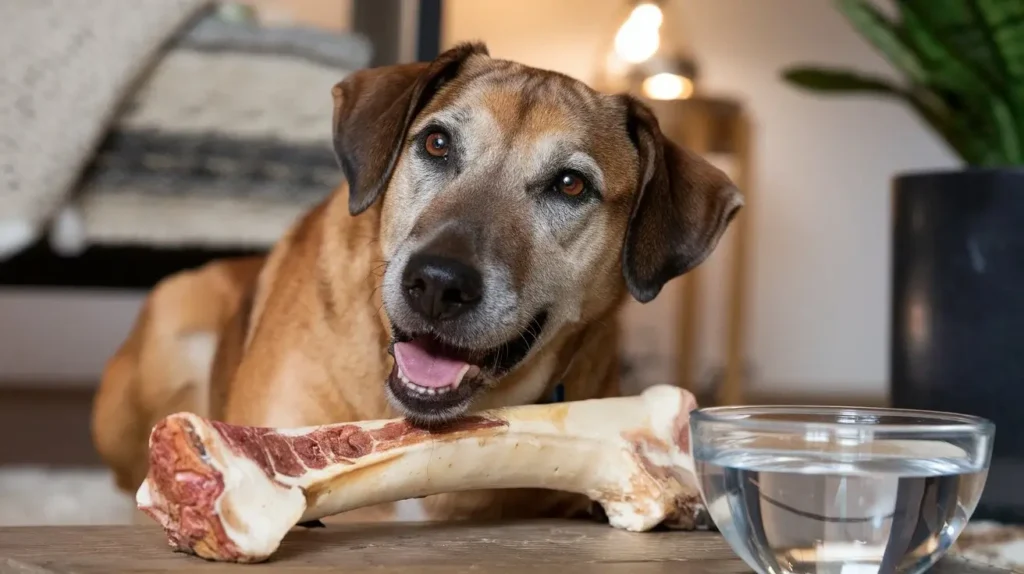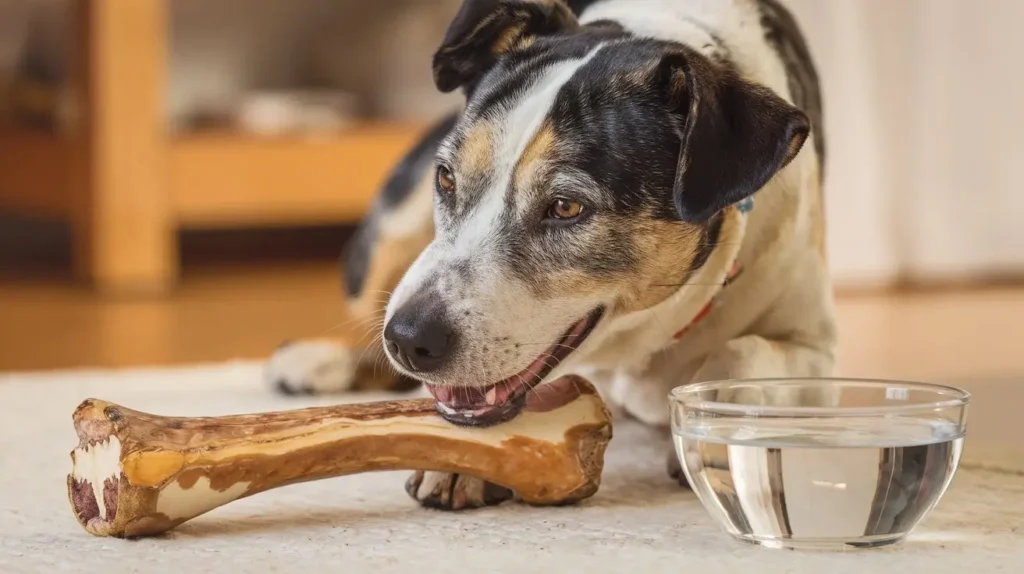Introduction: Exploring the Benefits of Bone Marrow for Canines
As dog owners, we’re always on the lookout for ways to enhance our furry friends’ health and happiness. One topic that often comes up in canine nutrition discussions is the potential benefits of bone marrow. But is bone marrow good for dogs? This detailed guide will explore canine nutrition, specifically examining whether bone marrow benefits dogs, along with the advantages and drawbacks of including it in their diet.

Understanding Bone Marrow: What Is It and Why Does It Matter?
But before looking into whether it’s any good for dogs, a better understanding of what it actually is will be appropriate. Bone marrow refers to the spongy tissue inside bones. There are two types: red marrow, responsible for the production of blood cells, and yellow marrow, primarily composed of fat. Both options are packed with nutrients that may positively support your dog’s overall health.
The Nutritional Profile of Bone Marrow
Bone marrow is packed with various nutrients that can contribute to your dog’s overall well-being. Here’s a breakdown of its key components:
- Healthy fats
- Proteins
- Vitamins (A, E, and K)
- Minerals (iron, zinc, and selenium)
- Collagen
These nutrients play crucial roles in various bodily functions, from supporting the immune system to promoting healthy skin and coat.
Is Bone Marrow Good for Dogs? Exploring the Potential Benefits
Now, let’s tackle the crucial question: is bone marrow beneficial for dogs? The answer isn’t a simple yes or no. While bone marrow can offer several health benefits, it’s essential to consider various factors before incorporating it into your dog’s diet.
1. Joint Health and Mobility
One of the most touted benefits of bone marrow for dogs is its potential to improve joint health. The high collagen content in bone marrow may help support your dog’s joints, potentially reducing the risk of arthritis and improving mobility as they age.
2. Nutrient-Dense Energy Source
Bone marrow is a rich source of healthy fats, providing a concentrated energy source for dogs. This can be particularly beneficial for active dogs or those needing to gain weight.
3. Skin and Coat Health
The vitamins and minerals found in bone marrow, particularly vitamin E and zinc, can contribute to a healthier skin and shinier coat for your furry friend.
4. Immune System Support
Bone marrow contains key nutrients, such as iron and zinc, which are vital for maintaining a robust immune system, helping your dog combat infections and illnesses more efficiently.
5. Mental Stimulation
Chewing on bones with marrow can provide mental stimulation for dogs, helping to alleviate boredom and reduce destructive behaviors.
Is Beef Bone Marrow Good for Dogs? Examining a Popular Option
When it comes to bone marrow for dogs, beef is often the go-to choice for many pet owners. But is beef bone marrow specifically beneficial for dogs? Let’s explore this popular option in more detail.
Benefits of Beef Bone Marrow
Beef bone marrow is especially loaded with nutrients that can enhance your dog’s well-being:
- High-quality protein
- Healthy fats, including omega-3 and omega-6 fatty acids
- Essential minerals like calcium and phosphorus
- Natural glucosamine and chondroitin for joint health
Potential Risks of Beef Bone Marrow
While beef bone marrow can offer numerous benefits, it’s crucial to be aware of potential risks:
- High fat content may lead to weight gain if overfed
- Risk of choking or intestinal blockage if bones are consumed
- Potential for bacterial contamination if not properly handled or prepared
Is Raw Bone Marrow Good for Dogs? The Raw Feeding Debate
Interest in the raw feeding movement has grown over the past years, with most dog owners opting to feed their pets raw diets. But is bone marrow raw good for dogs? Let’s explore the advantages and disadvantages of offering raw bone marrow to your furry friend.
Potential Benefits of Raw Bone Marrow
- Preservation of natural enzymes and nutrients
- Improved dental health through natural chewing
- Potentially more palatable for some dogs
Risks Associated with Raw Bone Marrow
- Increased risk of bacterial contamination (e.g., Salmonella, E. coli)
- Potential for choking or internal injuries from sharp bone fragments
- Imbalance in nutrient intake if not properly portioned
Is a Marrow Bone Good for Dogs? Exploring Different Forms
When considering bone marrow for your dog, you might wonder: is a marrow bone good for dogs? Marrow bones come in various forms, each with its own set of benefits and potential risks.
Types of Marrow Bones
- Raw marrow bones
- Cooked marrow bones
- Smoked marrow bones
- Dehydrated marrow bones
Factors to Consider
When deciding whether a marrow bone is good for your dog, consider the following:
- The bone’s size in relation to your dog’s size
- Your dog’s chewing habits and dental health
- Any existing health conditions or dietary restrictions
- The source and quality of the bone

Are Beef Marrow Bones Good for Dogs? A Closer Look at Safety
While we’ve covered the potential benefits of beef bone marrow, you may still be asking: are beef marrow bones safe for dogs? Let’s delve deeper into this aspect.
Safety Considerations
- Risk of tooth fractures from hard bones
- Potential for intestinal obstruction or perforation
- Choking hazards, especially with smaller bone pieces
- Bacterial contamination if not properly handled or stored
Guidelines for Safe Consumption
To ensure your dog’s safety when offering beef marrow bones:
- Always supervise your dog while they’re chewing on bones
- Select bones that are appropriately sized for your dog’s breed and build.
- Remove the bone once the marrow has been consumed
- Avoid cooked bones, as they can splinter more easily
- Introduce marrow bones gradually to prevent digestive upset
How to Incorporate Bone Marrow into Your Dog’s Diet Safely
If you’ve decided that bone marrow could be a beneficial addition to your dog’s diet, here are some tips for safe incorporation:
- Start with small amounts to gauge your dog’s tolerance
- Choose high-quality, ethically sourced marrow bones
- Consider alternatives like bone broth for easier digestion
- Before implementing any major dietary changes, consult with your veterinarian.
Nutritional Alternatives to Bone Marrow for Dogs
While bone marrow can offer numerous benefits, it may not be suitable for all dogs. Here are some nutritional alternatives that can provide similar benefits:
- Fish oil supplements for omega-3 fatty acids
- Glucosamine and chondroitin supplements for joint health
- Lean meats for protein and essential nutrients
- Vegetable-based treats for vitamins and minerals
Expert Opinions: What Veterinarians Say About Bone Marrow for Dogs
To offer a balanced view on the subject, let’s look at the insights from veterinary professionals regarding the practice of feeding bone marrow to dogs.
Dr. Sarah Thompson, DVM
“Bone marrow can be a healthy indulgence for dogs, but it’s essential to keep it in moderation. The high fat content can lead to pancreatitis in some dogs, especially those prone to the condition. Always consult your veterinarian prior to introducing new foods into your dog’s diet.”
Dr. Michael Rodriguez, Canine Nutritionist
Bone marrow can be a great source of nutrition for dogs if fed correctly. It should never serve as a substitute for their regular diet. Think of it more as an occasional treat rather than as part of the staple diet.
Frequently Asked Questions About Bone Marrow for Dogs
To address some common concerns, here are answers to frequently asked questions about feeding bone marrow to dogs:
- Q: How often can I give my dog bone marrow?
A: This depends on your dog’s size, health, and dietary needs. Generally, once or twice a week as a treat is sufficient. - Q: Can puppies eat bone marrow?
A: While puppies can benefit from the nutrients in bone marrow, it’s best to wait until they’re older and have stronger teeth. Consult your vet for specific recommendations. - Q: Are there any dogs that shouldn’t eat bone marrow?
A: Dogs with pancreatitis, obesity, or certain gastrointestinal issues may need to avoid bone marrow. Always consult with your vet. - Q: How should I prepare bone marrow for my dog?
A: If offering raw, ensure it’s from a reputable source. If cooking, lightly heat to make it easier to remove from the bone without cooking the bone itself. - Q: Can bone marrow replace my dog’s regular food?
A: No, bone marrow should be treated as a supplement or occasional treat, not a meal replacement.

The Importance of Moderation: Balancing Bone Marrow in Your Dog’s Diet
While we’ve explored the question “Is bone marrow good for dogs?” it’s crucial to emphasize the importance of moderation. Like any treat or supplement, bone marrow should be given in appropriate amounts based on your dog’s size, age, and overall health.
Calculating the Right Amount
To assess the appropriate amount of bone marrow for your dog, take the following factors into account:
- Your dog’s weight and body condition
- Activity level
- Existing health conditions
- Overall diet composition
A general rule of thumb is to limit treats, including bone marrow, to no more than 10% of your dog’s daily caloric intake.
Monitoring Your Dog’s Response
After introducing bone marrow into your dog’s diet, it’s essential to monitor their response closely. Watch for signs such as:
- Changes in stool consistency
- Increased thirst or urination
- Changes in appetite
- Any signs of digestive discomfort
If you notice any adverse reactions, discontinue feeding bone marrow and consult your veterinarian.
Conclusion: Making an Informed Decision About Bone Marrow for Your Dog
In conclusion, while bone marrow can offer numerous health benefits for dogs, it’s not without risks. The answer to “Is bone marrow good for dogs?” Ultimately, the right amount varies based on several factors, including your dog’s specific health requirements, age, and dietary limitations.
Above all, whether you are thinking about beef bone marrow, raw marrow, or marrow bones in general, it’s essential to evaluate the potential benefits alongside the associated risks. Additionally, always prioritize your dog’s safety. Furthermore, consult with your veterinarian before making significant changes to their diet. Moreover, keep in mind that each dog’s needs may vary. Subsequently, what works for one pet might not be suitable for another. Nevertheless, bone marrow can provide certain nutritional benefits. Conversely, it also presents certain risks. Therefore, careful consideration is essential. In summary, the choice to incorporate bone marrow into your dog‘s diet should be approached carefully and with the advice of a professional.
Every dog is unique, and what works for one may not be suitable for another. By remaining knowledgeable and responsive to your dog’s needs, you can make the most informed choice about bone marrow and your pet’s overall nutrition.
Consider consulting with a veterinarian for personalized recommendations. Ultimately, the goal is to provide your
furry friend with a healthy and balanced diet that supports their
well-being. Ultimately, the goal is to ensure your furry friend leads a happy, healthy life, and bone marrow may or may not play a role in achieving that goal.








